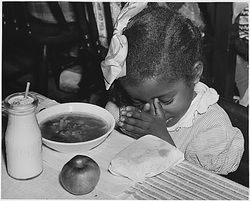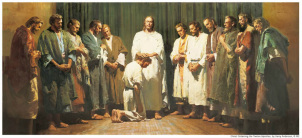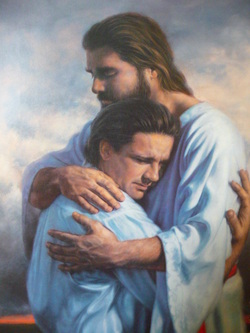 Painting by Simon Dewey by Benjamin Sokol “ I cannot with composure tell you how I feel about the Atonement. It touches the deepest emotion of gratitude and obligation. My soul reaches after Him who wrought it, this Christ, our Savior of whom I am a witness. I testify of Him. He is our Lord, our Redeemer, our advocate with the Father. He ransomed us with His blood.Humbly I lay claim upon the atonement of Christ. I find no shame in kneeling down in worship of our Father and His son. For agency is mine, and this I choose to do!”- Boyd K. Packer, President of the Quorum of the Twelve Apostles, Church of Jesus Christ of Latter-day Saints From a May 1988 address to the Church. Jesus Christ loves all of us very much. He knew that we would all make mistakes, and He knew that no one who makes mistakes can enter the presence of God. This presented a problem as justice and mercy contradict one other; how can the price for sin be paid when God shows us mercy? Jesus, in order to satisfy both justice and mercy, atoned for our sins at the Garden of Gethsemane and on the Cross. He felt all the suffering, the hatred, and the sins of every person who ever lived, and would yet live. He did not want to do this, because He knew this would be extremely difficult and extremely painful, but because He was the only perfect being that ever walked the earth, and He loved each and every one of us, He chose to do His Father’s will, and bore the pain, showing infinite mercy to us imperfect beings. Through His atonement, and our obedience and diligence, we can be with our Heavenly Father again. Though Christ did atone for our sins, our ticket to Heaven is not automatically stamped. This is where justice comes in. We have to do our part, which is baptism by immersion for the remission of sins, and repentance. We will continue to make mistakes, and unless we repent, we will be held accountable for them. We have what is called “agency”: the ability to choose our actions. There will be consequences, both good and bad, for the actions we choose. We will have to face those consequences. But through our diligence, our continual repentance, and our faith, the pain will be lessened. That doesn’t mean that we won’t face hard trials in our life. We all will. Trials by definition are just that: trying. The outcome will greatly depend on how we approach our trials and how we deal with them. If we work hard, and strive to be righteous, then we will be able to live with our Father in Heaven, and be able to inherit his Kingdom.
 By Benjamin BraggGod isn't nearly as cold and distant as some would make Him out to be. His love for you isn't just some vague, impersonal thing where He generally likes humanity because He created the world, the way an artist might like his painting. He loves each and every person on an individual level. He's the Father of our spirits, and He takes that title seriously. As gifted speaker, Boyd K. Packer of the Quorum of the Twelve Apostles of the Church of Jesus Christ of Latter-day Saints said in an October 2009 address: “ No Father would send His children off to a distant, dangerous land for a lifetime of testing where Lucifer was known to roam free without first providing them with a personal power of protection. He would also supply them with means to communicate with Him from Father to child and from child to Father. Every child of our Father sent to earth is provided with the Spirit of Christ, or the Light of Christ. We are, none of us, left here alone without hope of guidance and redemption.” Like any loving father, He wants to hear from us. You can talk to Him any time you want by praying to Him in the name of His son, Jesus Christ. It doesn't always have to be to ask for something or be about something of grave importance, either. You don't have to worry about wasting His time. Pray to thank God for something good that came your way. Pray for help calming down before that upcoming final. Pray to tell Him all of the lousy things that happened to you today and ask for relief. Whatever you say to Him, He'll be listening intently. Furthermore, He'll answer you! Precisely how and when God will answer your prayers is uncertain. He may have the Holy Ghost speak peace to your soul. He might have the Holy Ghost call an important fact to remembrance or dissuade you from making an unwise decision. He might put you in a position to accomplish your goals, or He might send another of His children your way to help shoulder your load. He might even reveal some hidden gems of truth and wisdom to you, illuminating your path, allowing you to see a bit of what He sees. What's certain is that He will answer you and the answer will come in the time and manner that is best for you. There are myriad ways that God answers prayers, so at times it might be difficult to tell whether something is a message from God, your own imagination, or from the devil. Here's a good test to differentiate between the two: Look at what you think you're being told. Does it persuade you to do good and serve your fellow man, or is it telling you to be selfish at the expense of others? If it's telling you to do good, then there's a good chance that it was from God. Even if it wasn't actually from Him and you follow it, you still ended up doing a good thing, so no worries! If you think you're being told to do something wrong that would hurt yourself or others, then there's just about zero chance that that bit was a communication from God. For example, being a loving God, your Heavenly Father wouldn't send you an angel telling you to burn down orphanages on Christmas eve, so you could quite readily dismiss such an ambassador as not coming from the Lord. “ For behold, the Spirit of Christ is given to every man, that he may know good from evil; wherefore, I show unto you the way to judge; for every thing which inviteth to do good, and to persuade to believe in Christ, is sent forth by the power and gift of Christ; wherefore ye may know with a perfect knowledge it is of God” ( Moroni 7:16).
 The Church of Jesus Christ of Latter-day Saints holds a special authority known as the Priesthood. Many unfamiliar with the LDS Church may wonder what this authority allows a Priesthood holder to do. First you have to know what the Priesthood is. The Priesthood is the authority of man to act with the power of God. There are two levels, the Melchizedek and Aaronic. I will only talk about the Aaronic Priesthood in this though. There are different names for it. The Priesthood of Aaron is also known as the “Lesser Priesthood.” This is due to the Melchizedek having more authority in spiritual matters. It’s known as the “Levitical Priesthood” due to Aaron being one of the sons of the Levi lineage. A last name it’s known by is the “Preparatory Priesthood.” This is due to it being a predecessor of the Melchizedek Priesthood. It allows you to practice the duties of the Lesser Priesthood to prepare you grasp the power and duties of the Higher, or Melchizedek Priesthood. Most often, however, it is just called the Aaronic Priesthood. There are three offices of the Aaronic Priesthood. There’s a deacon, a teacher, and a priest. Each of these successive offices adds more duties and assignments to a priesthood holder. A man can obtain the priesthood at the age of 12, starting as a deacon, and gaining experience as he moves from deacon, to teacher, to priest. “The offices are a part of the priesthood, but the priesthood is greater than any of the offices within it...The priesthood is yours forever unless you disqualify yourself through transgression.” The transgressions referred to in this are the greater sins, not the small daily mistakes we all make, but serious transgressions that require fervent repentance. Gifted speaker, Elder Boyd K. Packer of the Quorum of the Twelve Apostles of the Church of Jesus Christ of Latter-day Saints, once said in an April 2009 address: “You have been ordained to an office in the priesthood of God and given divine authority that is not and cannot be held by the kings and magistrates and great men of this earth unless they humble themselves and enter through the gate that leads to life eternal. “ The priesthood is a gift from God of the greatest kind. It shows that He trusts us as His children, to allow us to act in His name, and do what he would do, continuously striving to build up His kingdom. As a holder of the priesthood myself, I am truly amazed and grateful that the Lord would allow me to act in His name. He is my rock and my redeemer, and I hope to make Him proud by exercising this Holy power to the greatest of my abilities.
 This article was written by my friend and guest-writer, Cody Bosch Some of you may think, “It’s too late for us to repent.”, or that it’s too late to find the right person. This is not true. Others may feel that it’s too hard to quit their habit, and/or repent. This is false as well. Then others may feel that they aren't good enough, that they can’t keep up to the best of the best. This is also incorrect. As President of the Quorum of the Twelve Apostles, Boyd K. Packer states, “We cannot always expect to succeed, but we should try the best we can...Some needlessly carry a heavy burden of guilt which could be removed through confession and repentance.” There are different remedies for each of these. For quitting and repenting of a habit I’ll give another quote from President Packer: “Some worry endlessly over missions that were missed, or marriages that did not turn out, or babies that did not arrive, or children that seem lost, or dreams unfulfilled, or because age limits what they can do. I do not think it pleases the Lord when we worry because we think we never do enough or that what we do is never good enough.” We can always try. Each try we give should be our best effort, our whole self. For the matter of saying that it’s too hard, there’s a scripture In the New Testament that brings the answer into sharp focus. As stated in 1 Corinthians 10:13, “…God is faithful, who will not suffer you to be tempted above that ye are able; but will with the temptation also make a way to escape, that ye may be able to bear it.” Confession of sins to God, to ourselves, and to those we may have wronged, will help. It’s hard to do sometimes, but it is the first step of repentance and becoming whole once more. Just push yourself in each of your righteous endeavors. Push yourself to be rid of bad habits, to take on good ones. Push yourself to be a better son, daughter, sibling, parent, etc. Push yourself to be all that God knows you can be, and to the greatest of your potential. Be patient with yourself, but don't settle for anything less than your very best. You can learn more at Mormon.org/chat by chatting live with real missionaries of the Church of Jesus Christ of Latter-day Saints!
 The sensation of human guilt is as universal as it is varied. All of us have experienced at least some form of shame, guilt, embarrassment, or self-directed anger which tells us quite bluntly that our behavior fell below our standards. Guilt affects each of us in a similar way; we feel to some degree that we did something wrong, and we regret getting into these circumstances. But as each person is unique, so is each sin, and therefore each episode of guilt. So many nuances and subtle emotions can mingle with each episode, creating an experience that is simultaneously unique and all-too-common. This emotion, which is never pleasant, can be a very useful tool. A healthy dose of guilt causes us to recognize that we can do better, that our actions were unacceptable, that there is room for improvement, and motivates us to fix the situation. But used to excess by an over-critical mind, unnecessary guilt shifts the focus of shame from one's actions to one's overall worth as a human-being. “ Some anxiety and depression is caused by physical disorders, but much (perhaps most) of it is not pain of the body but of the spirit. Spiritual pain resulting from guilt can be replaced with peace of mind. In contrast to the hard words condemning sin, listen to the calming, healing words of mercy , which balance the harsher words of justice .” -President Boyd K. Packer of the Quorum of the Twelve Apostles of the Church of Jesus Christ of Latter-day Saints As Elder Packer's quote implies, the duty we have been given by Jesus Christ to “forgive all men” ( Doctrine and Covenants 64:10) applies not only to others, but also to ourselves. We all learn pretty early-on in life that other people are not perfect, and that we shouldn't expect perfection. But pretty often, we take a bit longer to learn that we shouldn't expect perfection from ourselves. It is commendable to reach for perfection, and to try every day to get a little closer, but when we set the bar at perfect, and view everything that falls short as failure, we're bound to get quite disappointed with ourselves. As any athlete knows, the key to success is practice and persistence and dedication over a long period of time. It is much easier to climb a staircase or a ladder than it is to jump directly from the ground to the same height. No high jumper has ever gone directly from the couch to a nine-foot vertical jump at the Olympics. This would be a marvelous overall goal for anyone to think of setting, but a goal that lofty would need to be comprised of many smaller goals to become a reality. “First, I'll work on routine and get that down. Then, I'll work to clear five feet. Then, I'll try to clear five feet and three inches, etc., etc.” A beginning jumper shouldn't be discouraged that he can't immediately jump over a house, and similarly, we shouldn't be discouraged just because we have some way to go on the road to spiritual and moral perfection. It's not something that happens right away, but something that comes little by little as we continually work for it.
 God has said that if we wish to live with Him once more, we need to be perfect, but He knows that we can't possibly do that on our own. As mortal beings, we are naturally weak and undisciplined. It is not only expected that we will mess up throughout our lives, but inevitable. So how can God expect perfection from children He knows are incapable of it?
It is with this in mind, that our Heavenly Father sent is Son, Jesus Christ to live among us. As God's Son, Christ had the capability to fully temper and control the natural urges and temptations that His mortal body would experience. Having absolutely no sin of His own, Christ gave Himself as a sacrifice for our sins, and also for our pains, infirmities, and yes, our guilt. He felt all of it. He experienced every bit of suffering that human family had, did, and would ever experience. And why? This was the price paid to allow us an out from our sins.
Thanks to this atonement made by Jesus Christ, our Savior, if we do everything we can to fix the situation presented by our misdoings, and gratefully acknowledge the miraculous sacrifice that Christ made, we can fully repent. And as far as God is concerned, the sin never happened. We are as clean and pure as the day we were born. This is how we achieve perfection, through Christ.
As we earnestly repent of our sins and misdeeds, and look upon Christ, we are given the wonderful gift of a clean conscience. There is no point to carry the shame with us once we have been forgiven by our loving Heavenly Father. It is time to forgive ourselves, and jettison any self-hate from our souls. God doesn't count it against us anymore. Why should we?
|







 RSS Feed
RSS Feed